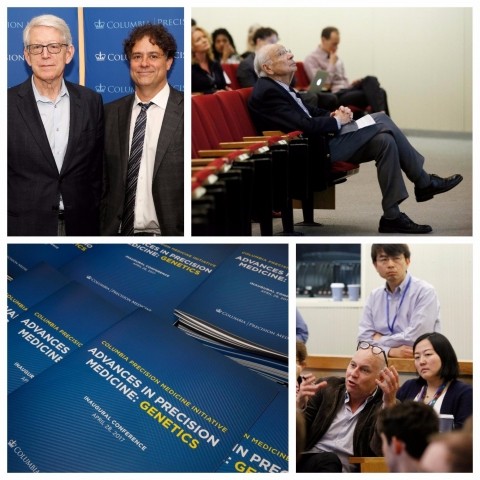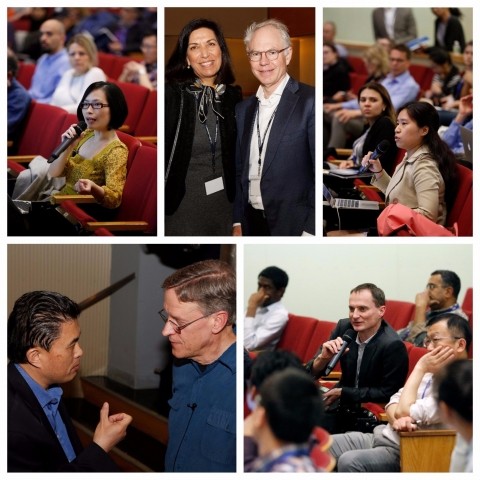When: Thursday, October 10- Friday, October 11th, 2024
Where: Jerome L. Greene Science Center, 3227 Broadway, 9th floor, New York, NY 10027
Please reserve your seat for this exciting two-day conference, Frontiers in Human Genetics. A detailed schedule will be posted closer to the event.
The Symposium will showcase transformative, fundamental research in Human Genetics for a broad audience of biologists and biomedical researchers. To this end, we bring together an interdisciplinary set of speakers (below) to present their work on the causes and consequences of genetic and environmental perturbations of human phenotypes.
Sarah Aitken (Cambridge University)
Nancy Cox (Vanderbilt University)
Michel Georges (Université de Liège)
Anjali Hinch (University of Oxford)
Inigo Martincorena (Sanger Institute)
Gil McVean (University of Oxford/Genomics PLC)
Simon Myers (University of Oxford)
Jennifer Philipps-Cremins (University of Pennsylvania)
Jonathan Pritchard (Stanford University)
Adrianna San Roman (Duke University)
Vijay G. Sankaran (Boston Children/Broad Institute)
Nasa Sinott-Armstrong (University of Washington)
Yun Song (University of California, Berkeley)
Oliver Stegle (European Molecular Biology Laboratories)
Miriam Udler (Mass Gen/Broad Institute)
Precision Medicine Conference: Genome and Chromatin Architecture
Friday, May 19, 2023 | 9:00 AM - 5:00 PM
Roy And Diana Vagelos Education Center, 2nd floor auditorium, 104 Haven Ave., New York, NY 10032
Our topic this year Genome and Chromatin Architecture and Precision Medicine, and our objective is to provide an up-to-date perspective on the relationship between DNA sequence and genome organization in space and time during normal cellular function and in diseased states. We provide examples of the dynamic regulation of genome folding interrogated by state of the art genomic and imaging technologies, and we explore the role of genome polymorphisms in chromatin organization and function. We have been fortunate to assemble and extraordinary group of pioneers in the development and application of technologies that probe and manipulate genome organization, revealing a previously unappreciated role of 3D genome structure dysregulation in human disease.
Schedule:
9:10am - Marcin Imielinski, MD, PhD, New York University Langone
10:00am - Jane Skok, PhD, New York University
10:50am - Geeta Narlikar, PhD, University of California, San Francisco
11:40am - Bing Ren, PhD, University of California, San Diego
12:30pm - LUNCH (provided in VEC 401)
1:30pm - Stavros Lomvardas, PhD, Columbia University
2:20pm - Jennifer Cremins, PhD, University of Pennsylvania
3:10pm - Anders Sejr Hansen, PhD, Massachusetts Institute of Technology
4:00pm - Alistair Boettiger, PhD, Stanford University
Networking Reception
GENOMIC INNOVATION AND PRECISION MEDICINE : READING, IMAGING, EDITING AND WRITING THE GENOME
APRIL 5, 2022. 9:00am - 5:00pm
MANHATTANVILLE CAMPUS, THE FORUM AUDITORIUM
A key objective of the conference is to provide an up-to-date perspective on the impact of genomic technologies on understanding the functional consequences of disease-associated DNA sequence variation on cellular and organismic function. For example, technologies that simultaneously interrogate RNA transcription, chromatin modification and chromosome structure in individual cells (multi-omics) are making it possible to probe deeply into the functional consequences of DNA sequence variation that associates with disease (at single cell, and single molecule, and atomic resolution). International leaders in the development and application of these technologies will come together to discuss progress and challenges.
Schedule:
8:45am: Registration opens, Atrium at The Forum
9:15am: Jay Shendure, MD, PhD, University of Washington
9:55am: Rahul Satija, PhD, New York Genome Center
10:35am: Joakim Lundeberg, PhD, KTH Royal Institute of Technology
11:15am: Xiaowei Zhuang, PhD, Harvard University
11:55am: Ed Boyden, PhD, Massachusetts Institute of Technology
12:35pm: LUNCH
1:30pm: Feng Zhang, PhD, Massachusetts Institute of Technology
2:10pm: Jef Boeke, PhD, NYU Langone Health
2:50pm: Tuuli Lappalainen, PhD, New York Genome Center
3:30pm: Olga Troyanskaya, PhD, Princeton University; Flatiron Institute
4:10pm: George Church, PhD, Harvard Medical School, Blavatnik Institute
4:50pm: Closing Remarks
5:00pm: Networking reception
Virtual Conference Via Zoom
Fifth Annual Columbia Precision Medicine Initiative (CPMI) conference, Advances in Precision Medicine: Genetics of Neurodevelopmental Disease.
The recent past has seen major advances in the understanding of the genetic and genomic architecture of neurodevelopmental disorders. We now have a deeper understanding of how genetic risk for many complex traits including neurodevelopmental disorders is driven by natural selection and distributed across the allelic spectrum.
While reliable results have emerged for conditions ranging from schizophrenia to bipolar disorder to autism, providing important insights into aspects of the neurobiology of these syndromes, a comprehensive understanding of their underlying biology is still out of reach.
In addition to the emerging genetic and molecular advances, there is the increasing realization that neurodevelopmental disorders target specific brain circuits. The interaction between genetic background, brain structure, and brain function is now the scientific background upon which specific neurodevelopmental conditions can be studied and understood.
Please click the links below for the available speakers lecture, or visit our video library here.
Conference Schedule:
Moderated by Thomas Lehner, PhD, MPH
Mark Daly, PhD, Harvard Medical School, University of Helsinki
Elise Robinson, ScD, Harvard T.H. Chan School of Public Health
Matthew State, MD, PhD, University of California, San Francisco
David Goldstein, PhD, Columbia University
Sergiu Pasca, MD, Stanford University
Nenad Sestan, MD, PhD, Yale School of Medicine
Columbia Precision Medicine Initiative
Friday, April 24, 2020, 9:50am - 3:15pm
Virtual Conference via Zoom.
4th Annual Columbia Precision Medicine Initiative (CPMI) conference: Advances in Precision Medicine: Harmonizing Clinical and Genomic Data.
One of the challenges facing us today is how to leverage the huge amounts of genomic data generated every day through regular patient care? How can this data be integrated into electronic health records in order to generate knowledge in a clinically useful way?
We learned about the most recent strategies to integrate large amounts of genomic data into electronic health records, to generate clinically-useful knowledge in these presentations. Please find the links to each talk below and also in our video library here.
David Ledbetter, Ph.D., Geisinger
Dan Roden, M.D., Vanderbilt University School of Medicine
Marylyn Ritchie, Ph.D., University of Pennsylvania
Rex L. Chisholm, Ph.D., Northwestern Feinberg School of Medicine
Chunhua Weng, Ph.D., Columbia University
Nancy J. Cox, Ph.D., Director, Vanderbilt University
David Madigan, Ph.D., Columbia University
Nicholas Tatonetti, Ph.D., Columbia University
Full conference program can be found here: https://precisionmedicine.columbia.edu/content/precision-medicine-society-conference-program-april-24-2020
Advances in Precision Medicine: Big Data
Columbia Precision Medicine Initiative 3rd Annual Conference
April 8th, 2019
The Forum, Columbia University, Manhattanville Campus
High-throughput molecular profiling technologies and the increasing availability of clinical data for research and in electronic health records give major opportunities to accelerate precision medicine using a variety of computational methods. We will learn about the latest research in machine learning, genomics, clinical research, electronic health records and data science.
Jeannette Wing, PhD, Columbia University
Ewan Birney, PhD, EMBL-EBI
Big Data in Health and Research, Opportunities, and Challenges
Goncalo Abecasis, PhD, Regeneron
Sequencing and Analysis of 100,000s of Human Genomes
Richard Durbin, PhD, Wellcome Sanger Institute
Rich Bonneau, PhD, New York University
Large-Scale Machine Learning Methods for Predicting Protein Functions from Sequence, Structure and Networks
Ron Shamir, MD, Tel Aviv University
On the Power of Integrated Analysis in Cancer and Precision Medicine
Barbara Engelhardt, PhD, Princeton University
The Importance of Modeling Patient State in Reinforcement Learning for Precision Medicine
George Hripcsak, PhD, Columbia University
Drawing Reproducible Conclusions from Observational Clinical Data
Mihaela van der Schaar, PhD, University of Oxford, UK
Personalized Treatments: Precision Medicine beyond Predictions
Jennifer Listgarten, PhD, University of California, Berkeley
Machine-learning Driven Protein and Molecule Design
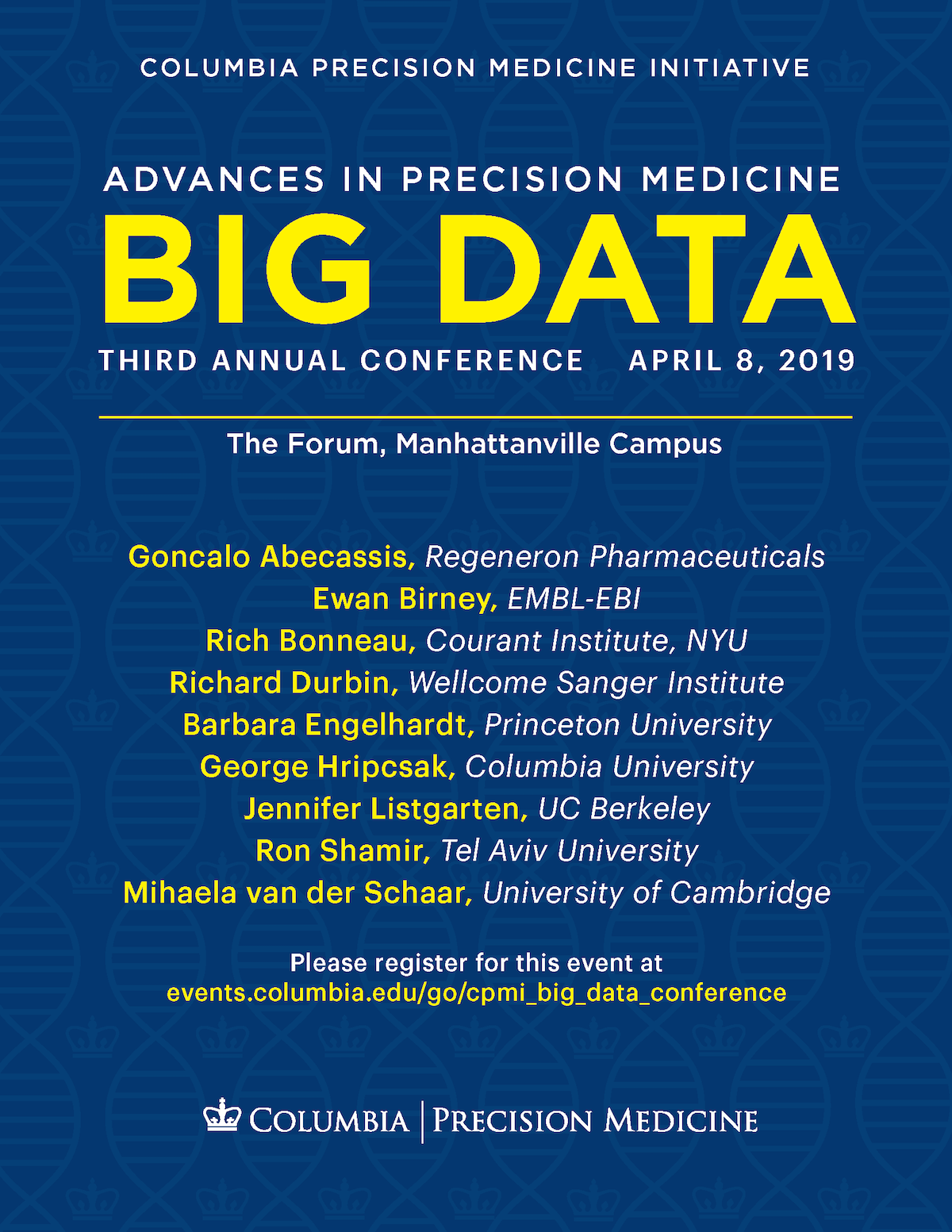
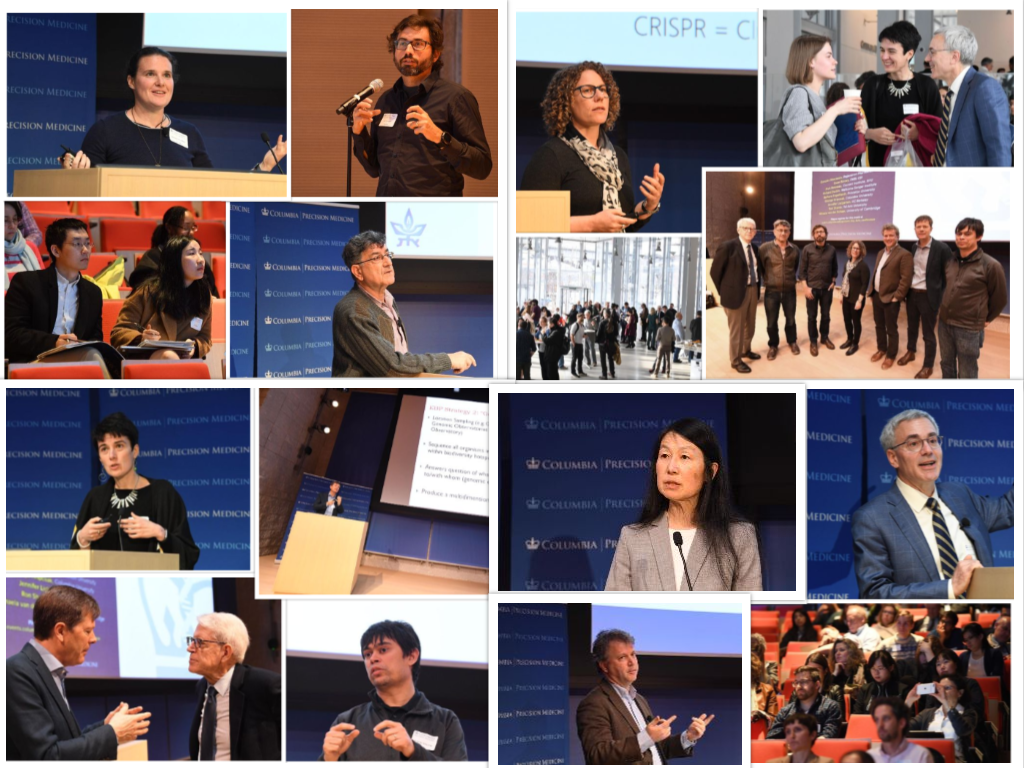
Accomplishing the objectives of CPMI requires advancing basic science, and the application of the resulting knowledge to the identification of genetic causes of human diseases, to the understanding of disease mechanisms, and ultimately to the treatment of a wide range of human diseases—from cancer to neurological diseases. To this end, CPMI is a truly University-wide effort. The bedrock of the initiative is strong basic and translational biomedical science practiced at Columbia University Irving Medical Center, the Zuckerman Institute, and the Morningside campus. Success of the initiative will also require many other academic disciplines at Columbia ranging from humanities, to engineering, to law and business.
With breathtaking advances in DNA sequencing, computer science, and clinical medicine, it is virtually certain that the number of diseases diagnosed and treated on the basis of genome sequence information will increase dramatically during the next decade. In addition, as we learn more about the relationship between genetic mutations, human biology, and disease, the genome sequence will play a central role in the practice of medicine. I believe that Columbia University, as a great liberal arts and scientific institution, is ideally positioned to bring the full force of an extraordinarily diverse and talented faculty to bear on the advancement of precision medicine.
Columbia University is a world leader in medicine, science, and technology, from fundamental discoveries to the clinic. The Columbia Precision Medicine Initiative (CPMI) utilizes the vast intellectual resources of Columbia faculty to drive this revolution in health care.
Advances in Precision Medicine: Cancer Genomics was held on Monday April 9th, 2018, on the Columbia University Medical Campus. We hosted 10 top international speakers, together bringing a broad focus spanning from research insights to clinical applications of cancer genomics.
Arul M. Chinnaiyan, University of Michigan
Luis Diaz, Memorial Sloan Kettering Cancer Center
Arnold Levine, Institute for Advanced Studies
William C. Hahn, Broad Institute; Dana-Farber Cancer Institute
Serena Nik-Zainal, University of Cambridge
Raul Rabadan, Columbia University
Nitzan Rosenfeld, University of Cambridge
Charles Sawyers, Memorial Sloan Kettering Cancer Center
David Tuveson, Cold Spring Harbor Laboratory
Catherine Wu, Broad Institute; Dana-Farber Cancer Institute
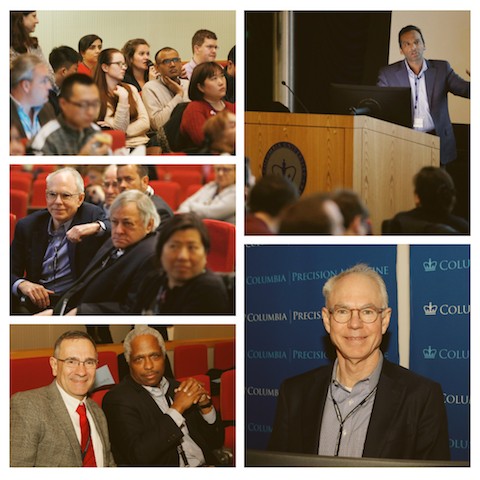
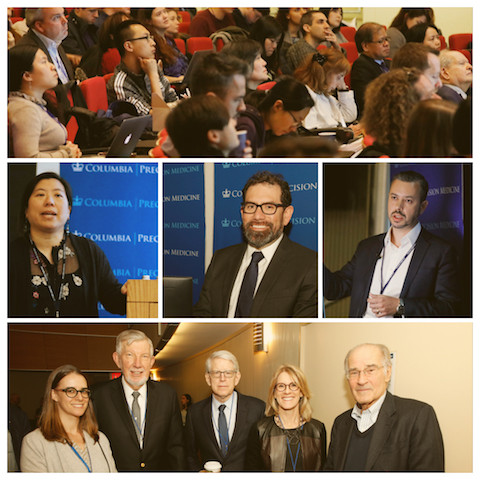
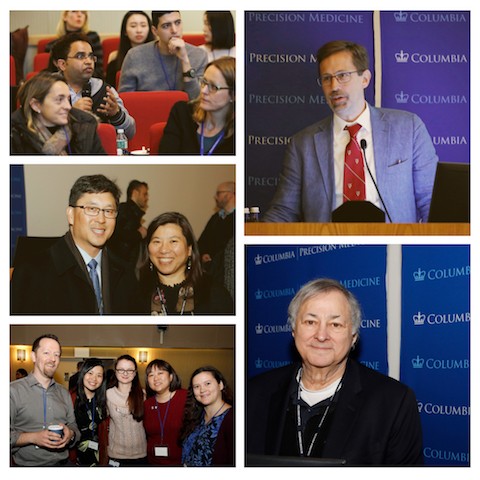
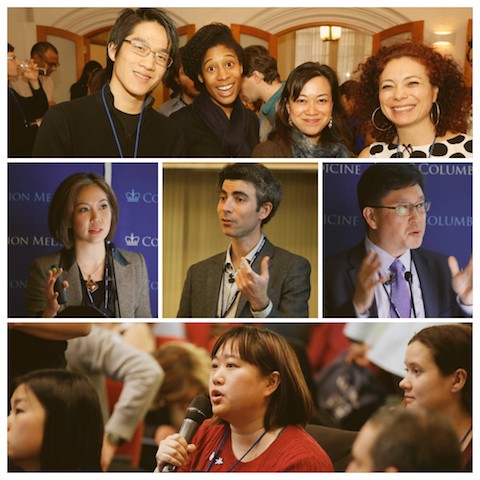
At the Inaugural Columbia Precision Medicine Initiative (CPMI) conference: Advances in Precision Medicine: Genetics, we heard about cutting-edge genetics research from international leaders in the field whose research advances the basic science of genetics and impacts the application of genetics to the understanding and treatment of human genetic disease.
Accomplishing the objectives of CPMI requires advancing basic science, and the application of the resulting knowledge to the identification of genetic causes of human diseases, the understanding of disease mechanisms, and ultimately to the treatment of a wide range of human diseases ranging from cancer to neurological diseases. To this end, CPMI is a truly University-wide effort. The bedrock of the initiative is strong basic and translational biomedical science practiced in the Medical School, the new Zuckerman Mind Brain and Behavior Institute, and the Morningside campus. Success of the Initiative will also require many other academic disciplines at Columbia ranging from humanities, to engineering, to law and business.
With breathtaking advances in DNA sequencing, computer science, and clinical medicine, it is virtually certain that the number of diseases diagnosed and treated on the basis of genome sequence information will increase dramatically during the next decade. In addition, as we learn more about the relationship between genetic mutations, human biology, and disease, the genome sequence will play a central role in the practice of medicine. I believe the technology is here and essential groundwork has been established. Columbia University is ideally positioned to bring the full force of an extraordinarily diverse and talented faculty to bear on the advancement of precision medicine.
John Hardy, PhD: Personalized Medicine for the Major Neurodegenerative Diseases: Genetic Predictions & Mechanistic Insights
Jonathan Pritchard, PhD: The Genetic Architecture of Complex Traits: From Polygenic to Omnigenic
